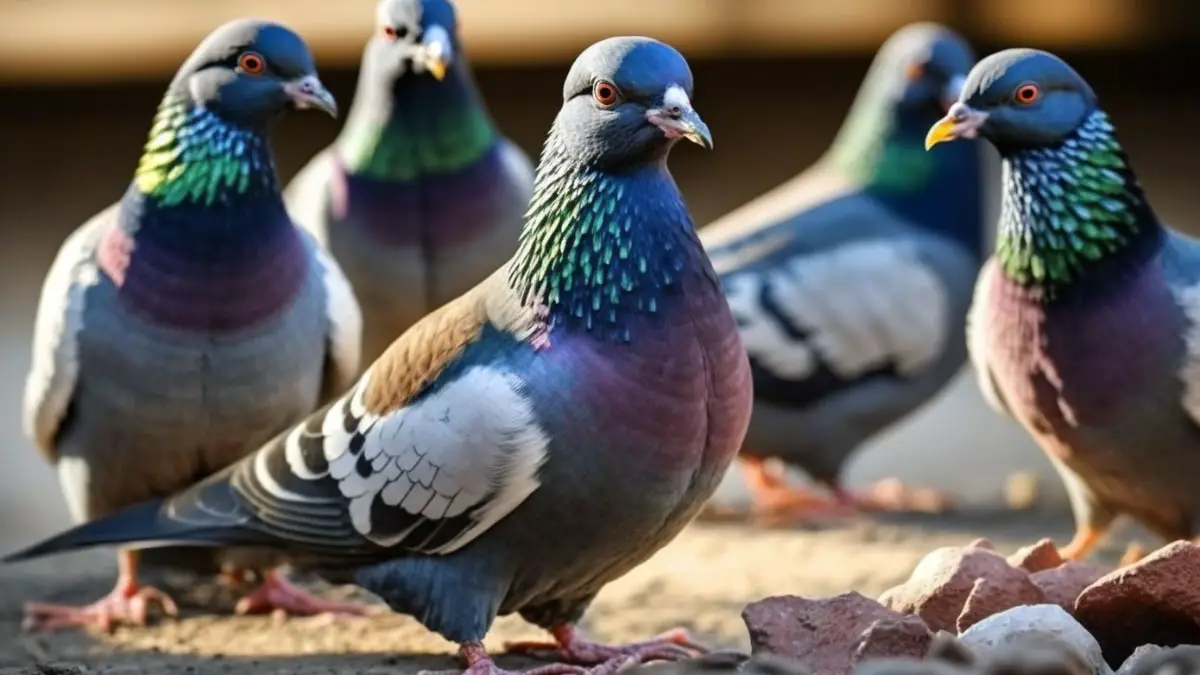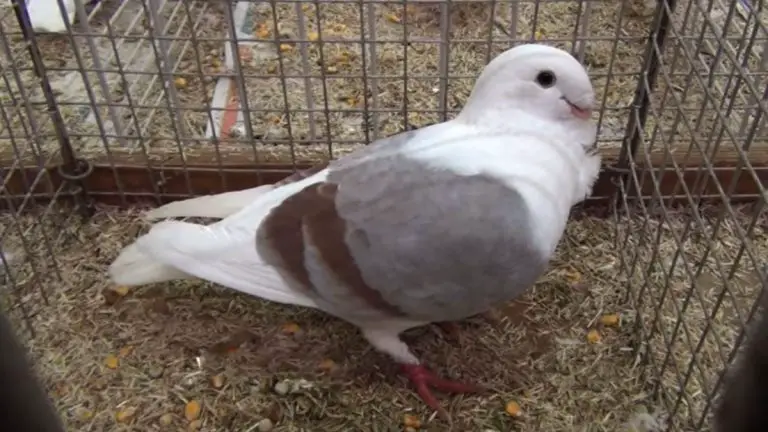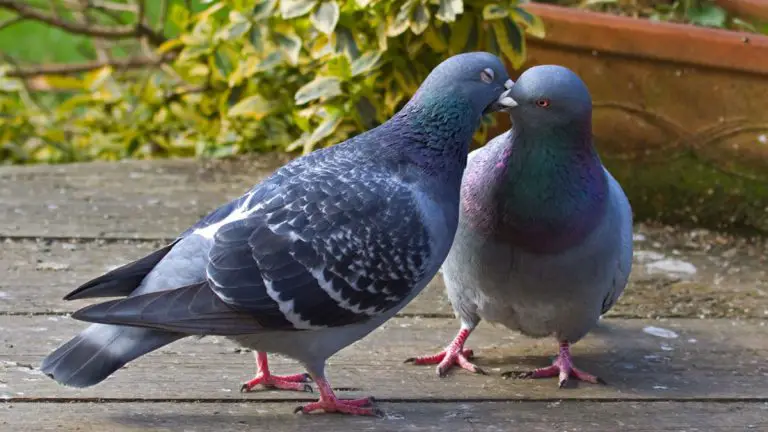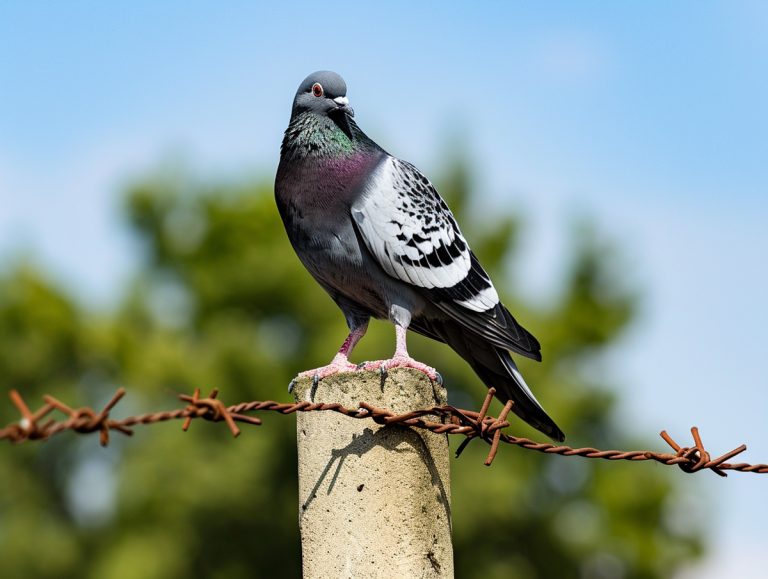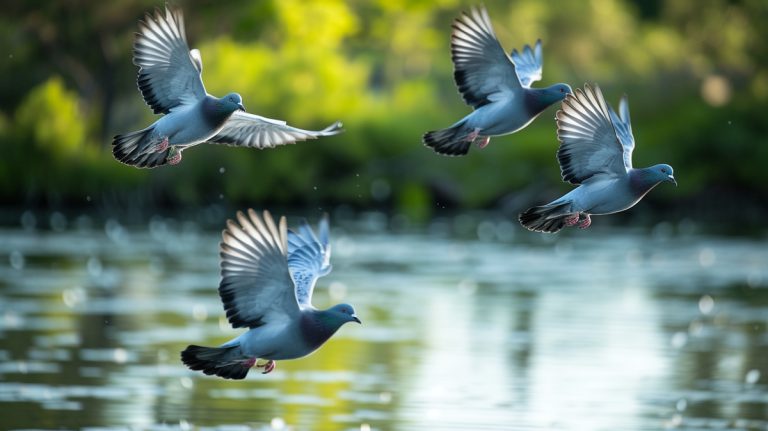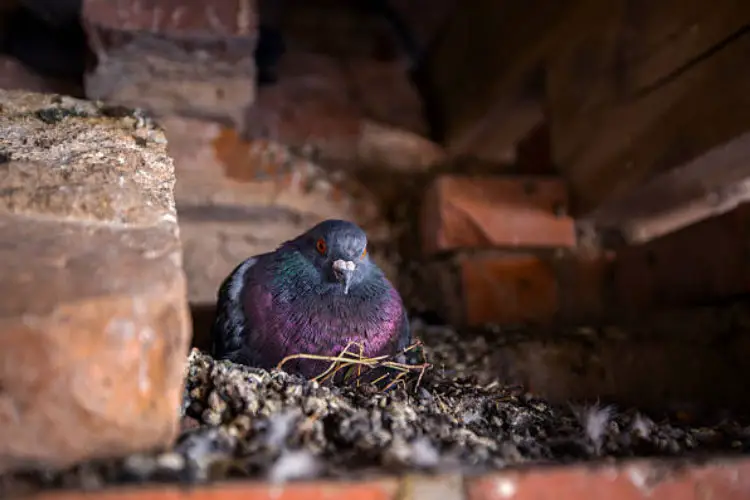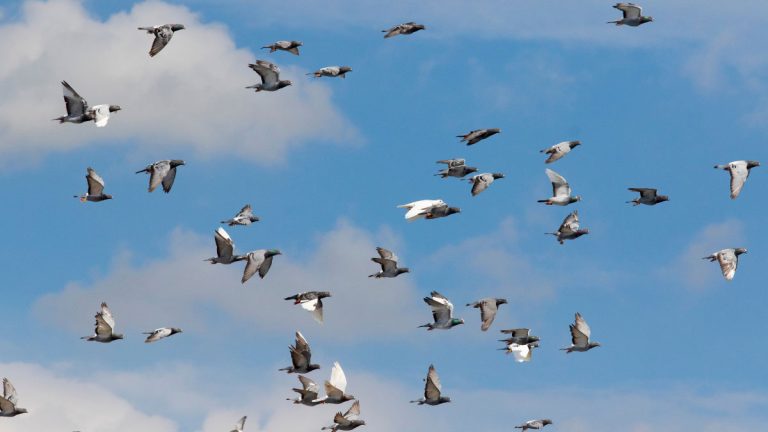What Sound Does a Pigeon Make? Common Pigeons Sounds and Noises Explained.
Pigeons can make a few types of sounds depending on specific situations, but what sound does a pigeon make? In this guide we’ll see the types of sounds pigeons make and know about the precise details of each.
So what are the sounds that pigeons make? Well, mainly they make cooing, whistling buzzing and grunting sounds to communicate, wing-clapping noises before flying, and feet stepping noise while trying to alert other pigeons.
If you want to raise pigeons or are just interested to know about them then learning about the noises they make can be interesting and helpful. Knowing about the sounds will allow you to understand their behavior more in-depth.
What Sound Does a Pigeon Make?
Pigeons make a variety of sounds for various reasons. Following are some of the sounds pigeons make with reasons.
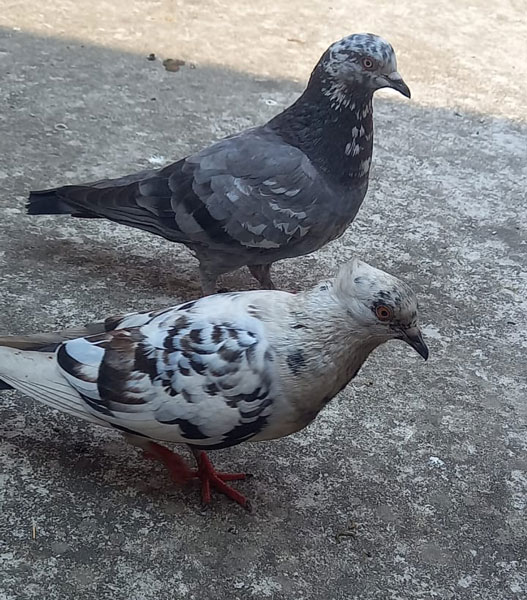
Cooing For Communication
Cooing is the most common sound pigeons make. It would be hard to find someone who has seen pigeons and never heard them coo. They coo for many reasons but mainly for three discrete ones: Protecting their territory, Breeding and General Communication.
Pigeons usually breed six to eight times per year with two-three eggs per clutch. In warmer countries, they’ll breed year-around while in colder places, they’ll wait for the temperature to get normal before starting their breeding season.
If you approach a wild pigeon, it’ll coo because it’ll think of you as if you’re trying to hurt it. It’s a natural response when they sense something as a threat such as a predator bird.
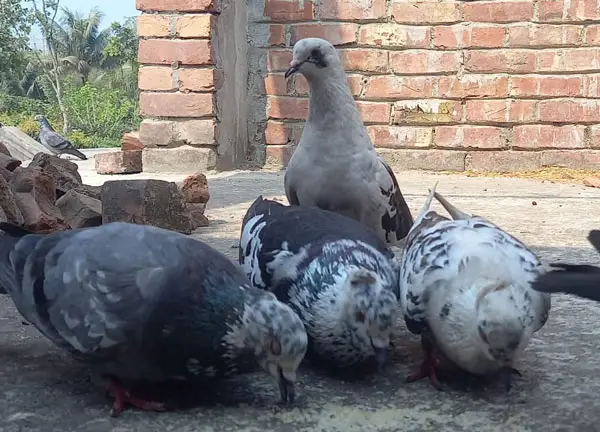
While in the wild, pigeons live in groups of families. Both male and female pigeons will have some form of territorial nature in them while living in groups. They use the cooing sound to fend off attacks from other male and female pigeons from other families.
Cooing is a sign pigeons use before starting their first breeding time. They’ll coo to attract a mate and once finding one is completed, the couple will bond for their lifetime. However, if one of the original partners dies then the other mate will look for another one. Cooing is also used when they show a liking to a partner.
Pigeons can sing too. They do it by cooing for a prolonged period. A pigeon does this when it’s trying to attract its partner or trying to get a mate. Cooing with a harmonious rhythm can actually be quite nice to listen to. Singing is also accompanied by a beautiful display of a pigeon’s wing movements.
Baby Pigeon’s Buzzing Noise
Baby pigeons don’t have their eyes fully developed until they’re a few weeks old. In that time, they can sense if a predator is flying toward or coming close to them by using their hearing capabilities.
Squabs have the ability to hear low-frequency sounds which helps them sense threats before their eyes are matured.
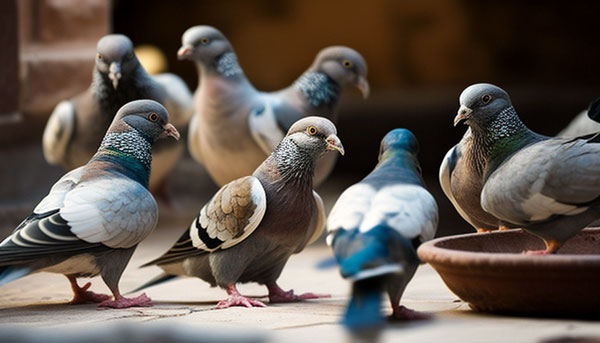
When squabs sense threats, they’ll make a buzzing noise similar to grunts to let their parents know of the imminent danger. Also, they make this sound to ward off predators. If a predator comes close when the parents are away, the squabs will use their beaks to attack the predator.
Grunting Noise
Grunting is similar to cooing, but it’s shorter and sharper. Pigeons grunt when they sense a predator; until the predator leaves, they’ll keep grunting. By doing this, a pigeon lets others know about the trouble. After a threat has gone, it’ll make grunting noises until it feels safe again.
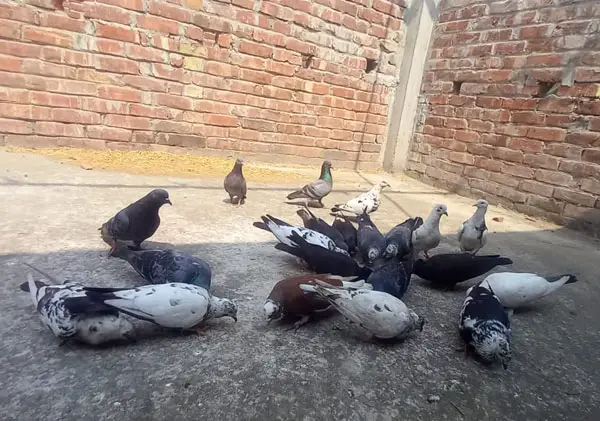
If you have a pet pigeon, you can listen to its sound to check if it’s grunting or cooing. One major difference between these two is that cooing is longer and happens for a long period, while grunting is shorter, and the sound isn’t continued as long as a coo.
Feet Stepping Noise
A pigeon can tread its feet for several reasons. A common reason is when it’s trying to attract the attention of other pigeons. It’s usually done when a pigeon senses a threat or just feels troubled by some external factor. Also, hair or debris can get stuck on the pigeon’s feet, and it will tread its feet to remove that.
Pigeons, when a predator gets close to them, will try to tread their feet and attack the predator with their beaks. Pigeons can’t bite, but a sharp hit by their pair of beaks can hurt a lot, especially if the predator is a moderately small bird.
Wing Clapping Noise
Pigeons make wing-clapping noises a few times. First, they make it when they’re startled by something. They try to ward off predators or scare them away by clapping noises.
Secondly, they clap their wing muscles before taking flight. And finally, male pigeons will do this too to display them to opposite genders.
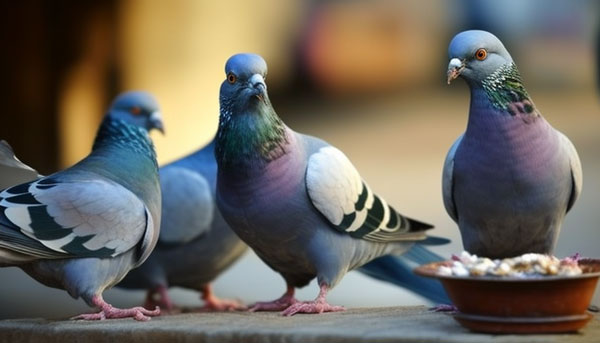
Also, when a pigeon is scared while it’s in flight, it’ll clap its wings faster to create a sharp noise that can be distinguishable from the normal flapping sound. It is to show other nearby pigeons that a predator is close. This noise can alert other pigeons.
Whistling and Squealing
Baby pigeons or squabs can’t make all the noises an adult pigeon can. Because their vocal cord takes time to develop, squabs need to rely on one or two sound types at most.
A squab can make squealing or whistling noises if it needs to attract the attention of its parents. Since it can’t eat everything independently, it has to depend on its parents for all the feeding requirements.
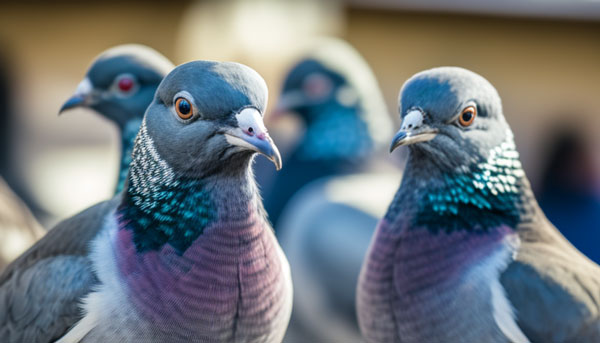
In the wild, pigeons can make nests on window sunsets or on top of trees. Sometimes baby pigeons will fall from the nest and use their whistling noise to attract attention from people and other pigeons to get themselves rescued.
A baby pigeon usually doesn’t take a long time to develop its vocal cord completely. Within 4 weeks of its birth, it can flap its wings, and in 6 weeks, you can expect it to fly. The vocal cord takes a bit longer to develop. At 8 weeks, the pigeon can create almost all the sounds an adult pigeon makes.
If you’re interested in learning more about pigeons and their interactions with other animals, our articles on pigeon roofing and eagles eating pigeons can provide interesting insights. Our article on pigeon roofing covers different types of roofing that can help attract and protect pigeons. If you’re curious about eagles and their diet, our article on do eagles eat pigeons explores the relationship between these two birds and how it can impact the pigeon population. With our articles, you can deepen your knowledge of pigeon behavior and their place in the animal kingdom.FAQ
Let’s talk about a few commonly asked questions.
A pigeon can coo for several reasons. Mainly they do this to attract the opposite gender to start breeding with or just to protect their house from a predator. It can also do this with other pigeons if there’s a clash between two male pigeons.
In case a pigeon’s cooing to defend its living area, it’ll also show some physical movements such as feather display, bowing, and tail movement to scare the opponent off.
Similar to cats, pigeons will purr in a group. Purring is similar to cooing, but it’s done in larger groups because it’s a form of their socialization process. Through purring, they express that they have a good bond and are feeling happy about it.
While flying, pigeons make a low, continuous sound of their wings flapping in the wind. It is kind of like a whistle while being not too loud. Having said that, they can flap their wings louder should they need to alarm other nearby pigeons of a threat.
Final Words
Now you have some ideas about the typical pigeon noises and will hopefully be able to identify them.
If you’re learning about the sounds to detect unwanted pigeons coming near your house and prevent them from further happening, you have got to be careful in other areas too. For example: don’t leave grains for them outside. If you don’t feed them, eventually, they’ll not gather around the house anymore.
Pigeons can be a pest. Regardless, they’re one of the best pets and most intelligent feathered friends you can get. If you get a pigeon and take good care of it by knowing more about it, your bird will create a long-lasting bond with you.
